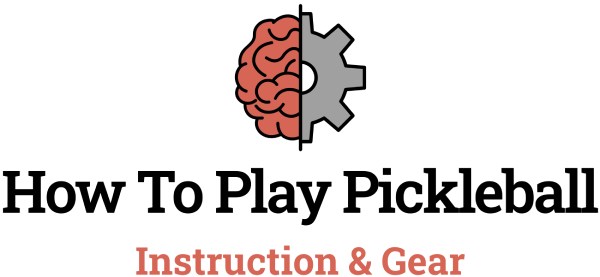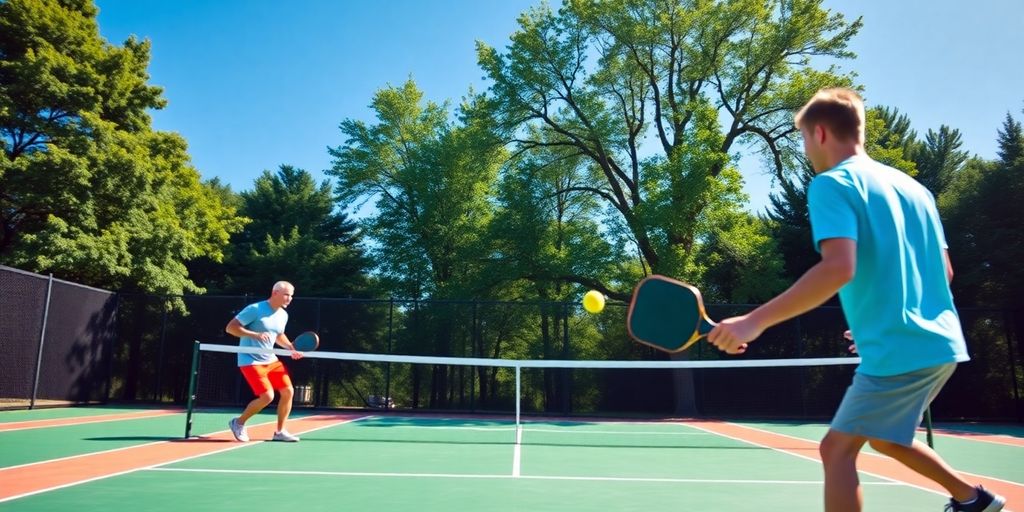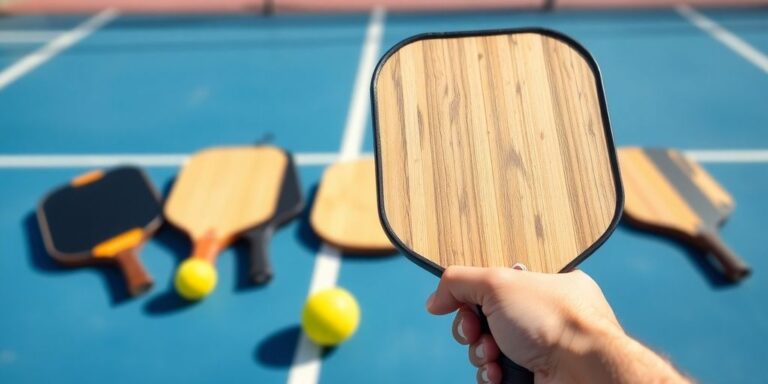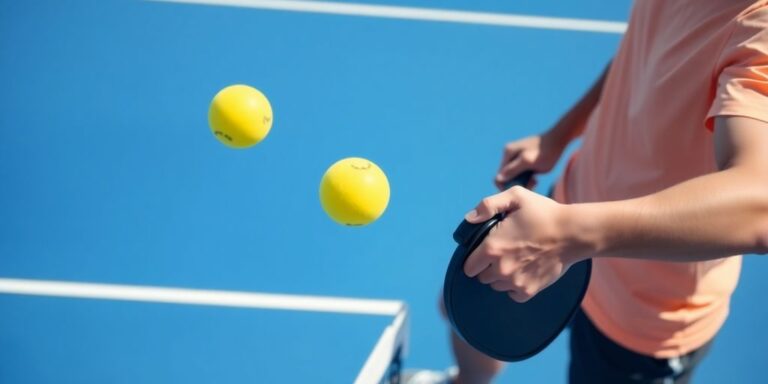So, you want to play some pickleball, right? But maybe you’re scratching your head, wondering, “Where are the pickleball courts near me?” It’s a common question, and honestly, finding a good spot to play can sometimes feel like a treasure hunt. Don’t worry, though, I’ve got your back. This guide is all about helping you find those perfect pickleball courts, whether they’re hidden gems or well-known spots. We’ll look at different ways to track them down, from using apps to checking out local places.
Key Takeaways
- Online tools, like apps and websites, are super handy for finding pickleball courts near you.
- Local parks, community centers, and YMCAs often have courts available for public use.
- Don’t forget about schools and universities; they might open their courts when classes aren’t in session.
- Joining local pickleball groups or clubs can help you find games and meet other players.
- If all else fails, you can always set up your own pickleball court, even if it’s just a temporary one in your backyard or driveway.
Leveraging Online Resources for Finding Pickleball Courts
Finding a place to play pickleball used to be a bit of a scavenger hunt, but these days, the internet has made it way simpler. You don’t have to drive around hoping to stumble upon a court anymore. Now, with just a few clicks, you can usually pinpoint exactly where to go.
Utilizing Pickleball Apps and Directories
When you’re trying to find a court, pickleball-specific apps and online directories are your best bet. These tools are designed just for this purpose, making the search super efficient. They often have filters for things like court type (indoor/outdoor), number of courts, and even if there’s lighting for evening play. It’s like having a dedicated court finder right in your pocket.
- Download a popular pickleball court finder app.
- Use the location services to find courts nearby.
- Check for details like court surface and availability.
These apps and directories are constantly updated by players and facility managers, so the information is usually pretty current. It’s a community effort that benefits everyone looking to get on the court.
Exploring Comprehensive Online Court Finders
Beyond the dedicated pickleball apps, there are also broader online court finders that include pickleball as one of their sports. Think of them as general sports facility databases. While they might not be as specialized, they can sometimes turn up courts you wouldn’t find on a pickleball-only platform, especially if the facility is multi-sport. For example, you might find LA City Parks listed here, which offers a variety of sports facilities.
| Website Type | Focus | Pros | Cons |
|---|---|---|---|
| Pickleball Directories | Exclusively pickleball courts | Highly detailed, community features | Might miss multi-sport facilities |
| General Sports Finders | Various sports facilities | Broader reach, includes multi-sport venues | Less specific pickleball details |
Connecting Through Social Media Groups
Social media isn’t just for cat videos and vacation photos; it’s also a surprisingly effective way to find pickleball courts and connect with other players. Many local communities have Facebook groups or other social media pages dedicated to pickleball. These groups are goldmines for real-time information.
- Search for "[your city] pickleball" on Facebook or other platforms.
- Join local groups and introduce yourself.
- Ask about popular playing spots and times.
- Look for posts about open play sessions or impromptu games.
People in these groups are usually happy to share where they play and might even invite you to join them. It’s a great way to not only find courts but also to start building your local pickleball network. You can also check your community’s park and recreation website for more information.
Discovering Local Community Play Spaces

Finding a spot to play pickleball often means looking right in your own neighborhood. Community spaces are usually the easiest places to start, and they often have courts that are either free or very low cost. It’s all about knowing where to look and who to ask.
Visiting Parks and Recreation Departments
Your local parks and recreation department is a goldmine for finding pickleball courts. These departments manage public parks, and many have dedicated pickleball courts or tennis courts marked for pickleball play. A quick call or visit to their website can give you a full list of available courts, their hours, and any reservation policies. Sometimes, they even have schedules for open play sessions, which is perfect for meeting other players. You might find that some parks have specific times set aside just for pickleball, so it’s worth checking those details. For instance, a project is underway to transform some tennis courts into dedicated pickleball courts at Walter Reed.
Engaging with Community Centers and YMCAs
Community centers and YMCAs are another fantastic resource for pickleball. These places often have indoor courts, which is great for playing year-round, regardless of the weather. They usually offer various programs, including pickleball lessons, open play, and even leagues. Membership might be required, but many offer day passes or guest options if you just want to try it out. It’s a good idea to check their activity schedules, as court availability can change based on other programs. For example, Courts Plus Community Fitness offers memberships that include pickleball lessons.
These community hubs are more than just places to play; they’re often where local pickleball communities really thrive. You’ll find players of all skill levels, from beginners to seasoned pros, and it’s a great way to get involved in the local scene.
Checking Local Sports Facilities
Beyond parks and community centers, many private or public sports facilities are adding pickleball courts due to the sport’s growing popularity. These can range from large multi-sport complexes to smaller, specialized racquet clubs. They might have more amenities, like pro shops or locker rooms, and often offer more structured play opportunities. It’s worth doing a quick online search for "sports facilities with pickleball courts near me" or checking local directories. You might find:
- Dedicated indoor pickleball courts.
- Outdoor courts with lighting for evening play.
- Organized leagues and tournaments.
- Coaching and clinics for skill improvement.
- Opportunities to find nearby pickleball games.
Always call ahead or check their website for court availability, fees, and any specific rules they might have. Some facilities require reservations, especially during peak hours.
Exploring Educational Institutions for Pickleball Courts
Who would’ve thought that your old stomping grounds might hold the key to your next pickleball match? Schools and universities often have fantastic sports facilities, and sometimes, they open them up to the public. It’s not always obvious, but with a little digging, you might find a hidden gem right in your neighborhood. Think about it: these places usually have well-maintained courts, and they’re often less crowded than public parks, especially during certain times.
Accessing School and University Courts
So, how do you get onto these courts? It’s not like you can just waltz in. The best way to find out about court availability is to reach out directly to the institution. You’re looking for their athletic department or maybe even a community outreach office. They’re the ones who handle scheduling and public access. Sometimes, they have specific programs or open court hours for community members. It’s worth a phone call or a quick email to see what’s what. You might be surprised at how welcoming some places are, especially if they’re trying to be more involved with the local community. Plus, playing on a school court can be a great way to learn pickleball basics in a more structured environment.
Contacting Athletic Departments for Availability
When you contact an athletic department, be clear about what you’re looking for. You want to know about pickleball court availability for public use. Here’s what you should ask:
- Are there designated pickleball courts, or are they multi-use?
- What are the specific hours for public access?
- Are there any fees involved, like a daily pass or a membership?
- Do they offer any organized play, like leagues or open play sessions?
It’s a good idea to be polite and persistent. Sometimes, the person you first talk to might not have all the answers, but they can usually point you in the right direction. Remember, these facilities are primarily for students, so public access might be limited or require advance booking. But when you do get in, you’ll often find high-quality courts that are perfect for a good game.
Utilizing Off-Peak Hours at Educational Facilities
One of the smartest moves you can make is to target off-peak hours. Think about when students aren’t typically using the courts. This usually means:
- Early mornings before classes start
- Late evenings after practices are done
- Weekends, especially during school breaks
- Summer months when most students are away
During these times, the courts are often less busy, giving you more space and less competition for court time. It’s a great strategy for getting consistent play without the crowds. And if you’re thinking about setting up your own court, knowing the dimensions and layout can help you design a pickleball court that’s just right.
Connecting with Local Pickleball Communities

Joining Local Pickleball Clubs and Associations
Finding a pickleball club or association in your area is a great way to get involved. These groups often organize regular play sessions, tournaments, and social events. It’s a fantastic way to meet other players and find out about courts that might not be widely advertised. Many clubs cater to all skill levels, so whether you’re just starting out or you’ve been playing for years, there’s likely a spot for you. You can often find these clubs through online searches or by asking around at local community centers. For example, many clubs are listed in directories, making it easier to find a pickleball club that fits your needs. Joining one of these clubs can really open up your pickleball world.
Participating in Organized Leagues and Events
Leagues and events are where the real action happens. They provide a structured environment to play, improve your skills, and compete. Think of it as a regular commitment to pickleball, which can be super motivating. These events range from casual round-robins to more competitive tournaments. Keep an eye out for announcements at local courts, community boards, or even on social media. Sometimes, local parks and recreation departments will also list upcoming leagues. Participating in these can really help you get better and make some new friends along the way. It’s a good idea to check out pickleball communities that host these kinds of events.
Getting involved with local pickleball groups is more than just finding a place to play; it’s about becoming part of a community. You’ll discover new courts, learn tips from experienced players, and maybe even find your next doubles partner. It’s a great way to stay active and connected.
Networking with Fellow Players
Networking in pickleball isn’t like a business meeting; it’s much more relaxed. It’s about chatting with people on the court, before and after games. Ask about their favorite courts, if they know of any open play times, or if they’re looking for partners. You’d be surprised how much information you can gather just by being friendly and approachable. Sometimes, the best way to find out about hidden gems or impromptu games is through word-of-mouth. Don’t be shy; most pickleball players are happy to share their knowledge and enthusiasm. This kind of informal networking can lead you to all sorts of local pickleball courts you might not have found otherwise.
Here’s a quick look at how different types of groups might organize play:
| Group Type | Typical Activities | Skill Levels | Frequency |
|---|---|---|---|
| Local Clubs | Organized play, social events, clinics | All levels | Weekly/Bi-weekly |
| Leagues | Structured matches, competitive play | Intermediate to Advanced | Seasonal |
| Informal Groups | Pick-up games, casual meetups | All levels | Daily/Weekly |
Here are some ways to connect with other players:
- Join online forums or social media groups: Many cities have dedicated Facebook groups or online forums where players coordinate games and share information.
- Attend open play sessions: These are great opportunities to play with different people and strike up conversations.
- Volunteer at local tournaments: Helping out at events is a fantastic way to meet a lot of players in a short amount of time.
Creating Your Own Pickleball Play Area
Setting Up a Temporary Pickleball Court
Sometimes, finding an open court feels like a treasure hunt, right? But what if you could just make your own? Setting up a temporary pickleball court is actually pretty straightforward and doesn’t require a ton of specialized gear. You just need a flat, open space. Think about your driveway, a quiet cul-de-sac, or even a large patio. The key is having enough room for the court dimensions, which are 20 feet wide by 44 feet long. You’ll need a portable net, which is super easy to set up and take down. Then, grab some chalk or painter’s tape to mark out the lines. It’s not permanent, but it gets the job done when you’re itching to play and all the local courts are booked. Plus, it’s a great way to introduce friends and family to the game without the pressure of a public court.
Creating your own temporary court gives you incredible flexibility. You can play whenever the mood strikes, without worrying about reservations or crowded public spaces. It’s all about making pickleball accessible right where you are.
Establishing a Permanent Backyard Court
Now, if you’re really serious about your pickleball, or maybe you just have the space and the budget, a permanent backyard court is the ultimate dream. This is a bigger project, for sure, but imagine having your own dedicated court just steps from your back door! It involves some planning, like choosing the right surface (asphalt or concrete are common), ensuring proper drainage, and getting the court dimensions just right. You’ll also need to consider the pickleball court cost for materials and installation. It’s an investment, but it adds value to your home and provides endless hours of fun. Plus, you can host your own tournaments and invite all your pickleball buddies over. It’s a game-changer for any true enthusiast.
Gathering Essential Pickleball Equipment
Whether you’re setting up a temporary spot or a permanent court, you’re going to need the right gear. Having the proper equipment makes all the difference in your game and overall enjoyment. Here’s a quick rundown of what you’ll need:
- Pickleball Paddles: These are different from tennis or badminton rackets. They’re solid and typically made from composite materials. For beginners, there are plenty of best pickleball paddles that offer a good balance of control and power.
- Pickleball Balls: These are plastic, perforated balls, similar to Wiffle balls but specifically designed for pickleball. There are indoor and outdoor versions, with outdoor balls usually being a bit heavier and harder.
- Portable Net System: Even if you’re planning a permanent court, a portable net is great for temporary setups or if you want to practice in different locations. They’re easy to assemble and transport.
- Court Markers: Chalk, painter’s tape, or even cones work perfectly for temporary lines. For a permanent court, you’ll need proper court paint.
- Comfortable Athletic Shoes: Good footwear is crucial for quick movements and preventing injuries on the court.
Having all these items ready means you’re always prepared for a game, whether you’re at home or heading out to find local pickleball courts.
Want to set up your own pickleball court at home? It’s easier than you think! Get all the tips and tricks you need to build your perfect play area by visiting our website today.
Conclusion
So, there you have it. Finding a pickleball court nearby doesn’t have to be a big mystery. With all the apps, websites, and even just looking around your own town, you’ve got plenty of ways to track down a good spot to play. Just grab your paddle and get out there. You’ll be hitting balls and making new friends in no time.
Frequently Asked Questions
How can I quickly find pickleball courts using my phone or computer?
Many apps and websites are like special maps for pickleball courts. They help you find courts nearby and sometimes even tell you about other players or games happening. Just search for “pickleball court finder” in your app store or on the internet.
Are there public places like parks or community centers where I can play pickleball?
Yes, lots of community places like parks, recreation centers, and YMCAs have pickleball courts. They often have times when anyone can come play, or you can join a group. It’s a good idea to call them or check their website to see what they offer.
Can I play pickleball at schools or universities?
Sometimes, schools and colleges let people use their courts when school isn’t in session. You might need to ask their sports department if their courts are open to the public and if there’s a small fee.
What’s the best way to meet other pickleball players in my area?
Joining a pickleball club or group is a great way to meet people who love the game. These groups often play together regularly and can help you find courts and new friends to play with.
What if there aren’t any pickleball courts close to me?
If you can’t find a court, you can make your own! All you need is a flat space, like a driveway or backyard, a portable net, some paddles, and pickleballs. You can even use tape to mark the lines.
Do I have to pay to play pickleball at most courts?
Some courts are free, especially in public parks. Others might have a small fee, or you might need to be a member of a club or community center. It’s best to check with the specific place you want to play.




